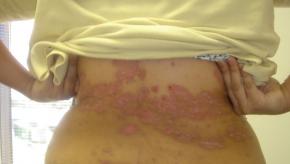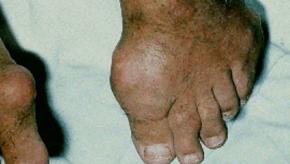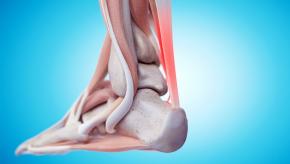All News
Danger with Hydroxychloroquine Nonadherence in SLE
A large cohort study shows that severe non-adherence to hydroxychloroquine (HCQ) results in serious risks for SLE flares, damage, and mortality.
Read ArticleHold the Methotrexate for One Week
In 2018, Park et al showed optimal responses to influenza vaccination in RA patients was best achieved by holding methotrexate for 2 weeks following immunization, with improved humoral responses. Now, a followup trial suggests that equivalent results are had by holding MTX for only 1 week with the "flu" vaccine.
Read ArticleSLE and Pregnancy Outcomes
Obstetric complications and poor pregnancy outcomes are not uncommon in women with SLE, especially with active disease. A large Spanish cohort trials shows that term pregnancy is more likely before the diagnosis of SLE and that poorer pregnancy outcomes were associated with antibody positivity to anticardiolipin IgG and anti-beta-2- glycoprotein IgG/IgM, but not lupus anticoagulant.
Read ArticleEULAR Points to Consider in Progressing Psoriasis to Psoriatic Arthritis
The transition from psoriasis to PsA – and the early diagnosis of PsA – is of considerable scientific and clinical interest. People typically have psoriatic skin disease for a decade or more before they begin to experience the joint involvement of PsA.
Read ArticleAnti-Drug Antibodies with Biologics (7.14.2023)
Dr. Jack Cush Reviews the news and journal reports on CVA, TKA, PJP, ADA, and more!
Read ArticleFilgotinib Effects on Semen and Sex Hormones
The oral Janus kinase 1 inhibitor filgotinib is available worldwide, but not in the USA, where the FDA held up its approval for use in RA due to unfinished studies of filgotinib's effects on sperm cells. The results of 2 phase two studies (MANTA and MANTA-RAy) confirm that filgotinib has no measurable impact on semen parameters or sex hormones in men with active IBD or inflammatory rheumatic diseases.
Read ArticleAntidrug Antibodies Impair Response to Biologic Drugs
Monitoring for antidrug antibodies with biologic has not been routine in rheumatology but a new study suggests that antidrug antibodies correlate with nonresponse to bDMARDs in rheumatoid arthritis (RA) patients.
Read ArticlePegloticase Plus Methotrexate in Refractory Gout - MIRROR Study 12 mos. Results
The 12-month safety and efficacy of pegloticase + methotrexate (MTX) in the MIRROR trial shows continued efficacy and tophi resolution after 12 months of therapy.
Read ArticleBiologics Keep Early RA in Check for at Least One Year
Treatment with at least some biologic drugs significantly reduced 1-year progression of early rheumatoid arthritis (RA) relative to classical small-molecule agents, researchers reported.
Read ArticleRA Biologics Lower COVID-19 Deaths, but Not Recovery Time
Do abatacept, cenicriviroc, or infliximab improve time to recovery for patients hospitalized with COVID-19 pneumonia compared with standard care?
Read ArticleBaricitinib Effective in JIA Subsets
A phase 3 trial assessed a selective Janus kinase 1/2-inhibitor, baricitinib, in patients with juvenile idiopathic arthritis (JIA), demonstrating it's efficacy and safety compared to placebo.
Read ArticleGCA and the Risk of Cerebrovascular Ischemic Events
Cerebrovascular ischemic events (CIE) can be one of the most severe complications of giant cell arteritis (GCA), but is seen in 4-5% of GCA patients according to a recent French University Hospital.
Read ArticleICYMI: ChatGPT - A Boon or Threat to Scientific Publication?
ChatGPT is a new, artificial intelligence chatbot that has dramatically changed the digital worlds of education, research, graphic design, statistics and more. While this AI driven platform has the untold potential in generating written content, there is considerable concern in assuring that human-generated content of research, education and publishing has veracity.
Read ArticleICYMI: Drug Safety Differences with New Novel Therapies in RA
Safety outcomes for targeted synthetic or biological disease-modifying antirheumatic drugs (b/ts DMARDs) used to treat RA were studied using data from the Anti-Rheumatic Therapies in Sweden (ARTIS) registry, showing that these newer agents are largely similar, but still have particular differences for specific infection or other adverse event risks.
Read ArticleICYMI: GRAPPA Recommendations for Treating Enthesitis in Psoriatic Arthritis
GRAPPA has provided new, evidence based updates to the management of enthesitis in patients with psoriatic arthritis (PsA), affecting at least 30% of PsA patients and is associated with more severe disease, x-ray damage, and poorer outcomes.
Read ArticleICYMI: 25 Great Women in Rheumatology
I reached out to many leaders in rheumatology and asked: who are the great women in rheumatology who should be recognized? This was prompted by a smart article in Annals of Rheumatic Disease written by Drs. Tuhina Neogi (Boston) and Nicola Dalbeth (N. Zealand), entitled "Where are the women ‘Heroes and Pillars of Rheumatology’?
Read ArticleICYMI: Carpal Tunnel - Steroid injection vs. Night Splinting
A prospective, pragmatic, open-label, randomized trial conducted by the UK National Health Service, studied interventions in patients with carpal tunnel syndrome (CTS) and found no advantage to either CTS corticosteroid injection (CSI) or night splinting (NS) as the initial treatment of CTS.
Read ArticleICYMI: New Laboratory Insights for the ANA+ Consult
A new study suggests that use of ELISA assays for CXCL-10 and IFN-α can predict which ANA+ individuals may progress to developing a systemic autoimmune rheumatic disease (SARD).
Read ArticleICYMI: RA Disease Activity and Alcohol Use
Despite its well known toxicities, alcohol is known to be antiinflammatory. The effects of alcohol use in rheumatoid arthritis (RA) is less known, but a recent study suggests that alcohol consumption was dose-dependently associated with lower disease activity and higher health-related quality of life in RA patients.
Read ArticleScleroderma – Thick and Thin (6.30.2023)
Dr. Jack Cush reviews the news, journal articles and regulatory decisions from the past week from RheumNow.com. This week focuses on parodoxical psoriasis, scleroderma outcomes and subsets, and alopecia areata therapy.
Read Article





















